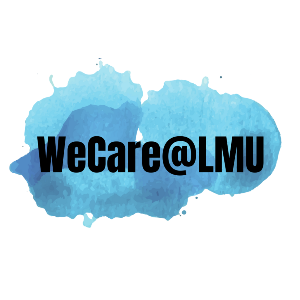Psychotherapy
If you feel burdened by psychological symptoms or restricted in your everyday life, you should contact a psychotherapist.
First point of contact for students
The Psychotherapeutic and Psychosocial Counseling Service of the Munich Student Union offers psychological support for students. They provide advice on various difficulties such as study problems, relationship conflicts, isolation, depression, addiction problems, and other psychological stressors. Appointments can be made by phone (registration times Mon - Fri 9:00 a.m. - 12:00 p.m.).
Psychosocial counseling for employees
The Office for Safety, Health, and Sustainability (SGN) offers all LMU employees support with professional and personal problems and crisis situations. Possible reasons for seeking counseling include stress and overload, signs of burnout syndrome, conflicts in the workplace, bullying, personal crises, addiction problems, or mental illness.
General points of contact
- Your family doctor can help you find a suitable psychotherapeutic treatment.
- In addition, there is a coordination center for psychotherapy at the Bavarian Association of Statutory Health Insurance Physicians, which can assist you in finding a therapy place.
- Of course, you can also contact registered psychotherapists directly to make an appointment for a psychotherapy consultation.
- Digital health applications can also be prescribed by medical or psychotherapeutic staff and are then covered by health insurance companies. You can find an overview of approved programs here.
Ambulances and special services for LMU students and employees
The Department of Psychology at LMU has several outpatient clinics that offer outpatient psychotherapy for various disorders. The clinics have different treatment focuses, and unfortunately, there is often a waiting period before treatment can begin. However, the following two clinics have agreed to temporarily offer psychotherapy consultations for LMU members:
- The Psychotherapeutic University Outpatient Clinic for Infants, Children, Adolescents, and Parents offers psychotherapeutic consultations for students up to the age of 21, as well as for student parents or employees who are parents.
- The MUNIP outpatient clinic of the Munich University Training Institute for Psychological Psychotherapy will also offer psychotherapeutic consultations for LMU members starting in January. If you would like to take advantage of this offer, please use the contact form and include the following information:
- WeCare@LMU
- Your name
- Your phone number (May we use your voicemail? When are you best reached at this number?)
- You will then receive a call back shortly to arrange an appointment. Appointments usually take place in the morning. You can choose whether you would like to come to our office at Leopoldstraße 44 or have a video call.
- The LMU Clinic helps patients suffering from early symptoms of psychosis and related disorders. Early detection and preventive treatment can often mitigate the course of the disease or even prevent its onset.
- Outpatient clinic for the early detection of psychiatric disorders in young adults
These consultations are billed to your health insurance company and serve to clarify the need for psychotherapy and, if necessary, to refer you to a suitable therapy program.
Situations of crisis
In acute mental health crises, you can contact the emergency room of psychiatric clinics directly:
- Clinic and Polyclinic for Psychiatry and Psychotherapy:
LMU Klinikum, Nußbaumstraße 7, 80336 Munich, Tel. 089 4400 - 55511 - Psychiatric crisis service:
People in mental crises, those affected and relatives receive qualified advice and support here around the clock. Tel. 0180 - 655 3000. Daily. 0-24 hours, website. - Telephone counseling:
Telephone counseling offers advice for problems and crises in every life situation.
Protestant telephone counseling: Tel. 0800 - 111 0 111, website.
Catholic telephone counseling: Tel. 0800 - 111 0 222, website.
Muslim telephone counseling: Tel. 030- 4435 09 821, website. - ARCHE e. V.:
The main task of the ARCHE association is outpatient suicide prevention and crisis intervention. To this end, it offers counseling for people in life crises, at risk of suicide, and after a suicide attempt (aftercare). Tel. 089 334041. Monday to Friday. 9 a.m. to 5 p.m., website. - Münchner Insel Krisen- und Lebensberatung:
Professional counseling for all kinds of problems, by phone at 089 / 22 00 41 and 089 / 21 02 18 48, office hours Mon-Fri 9 a.m., Thu 11 a.m.-6 p.m. Website. - Addiction Hotline Munich:
Counseling center for people at risk of addiction and addicts, those affected and their families can receive telephone counseling here at 089 / 28 28 22, Website. - You can find an overview of other social emergency services in Munich here.
Professional societies
Various institutions and professional associations have developed helpful online resources during the pandemic, which are freely available. The resources are diverse and provide information about potential challenges and how to overcome them:
- The German Psychological Society has compiled helpful information on dealing with a variety of challenges during the pandemic, which can be accessed at the following link.
- The LMU Munich Medical Center has also published a very informative page with various tips and instructions, link.
- Videos with information on coping with pandemic-related challenges from a psychological perspective are available on this page.
More specific material containing concrete exercises is also available online.
- A working group at the Max Planck Institute of Psychiatry in Munich has developed a short self-help program for dealing with social distancing, quarantine, and curfews, which is scientifically based and builds on tried-and-tested concepts, link.
- The Leibniz Institute for Resilience Research in Mainz has developed an online training course to strengthen stress resilience, which can be accessed free of charge at this link.
- The Center for Leadership and People Management provides a series of recordings in the “Digital Impulses” format on current topics (e.g., mindfulness, digital teaching, and working from home) online. You can find these in our multimedia section.


